Page Contents
In this special feature, I will share my personal experience of a recent health issue that got me admitted into the emergency department (A&E) at a government hospital. A place where I wouldn’t want to visit again.
How I ended up in A&E?
I had been feeling stressed recently because almost everyday I needed to rush home to fetch my kids from school at rush hour. This stress had been going on for a month or two.
One morning when I was in the train commuting to work, I was googling ‘black stool’ which happened to me consecutively for 4 days. At first, I thought I might have eaten some foods that are darker colour. But it can’t be for so many days.
Suddenly, I had a brain freeze kinda feeling. It was exactly the same sensation when a thick needle is being pulled out from my arm after a blood donation. A change of pressure that causes lack of blood in my brain. For a few seconds, I was almost passing out.
Medical appointment
I quickly got myself up, made a medical appointment with clinic. My appointment was 3pm. At the clinic, the doctor found that I looked rather pale. He did a few examinations, noticed that my heart rate was fast, but blood pressure was low, indicating loss of blood. With the symptoms I described, he suspected I had internal bleeding in upper gastrointestinal tract. The doctor immediately called an ambulance and sent me to the nearest A&E of a government hospital.
Bed crunch is not a new problem
4pm at the A&E, it was very crowded. At 5pm, it was my turn. In the triage room, I described my symptoms to the doctor, she did a finger prick to make sure I was not hypoglycemic (low blood sugar causing dizziness), did an ECG to check my heart rhythm. Nothing unusual was found, she needed further examinations to confirm.
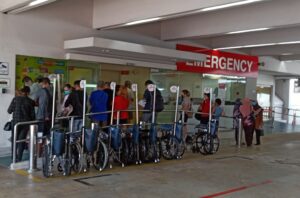
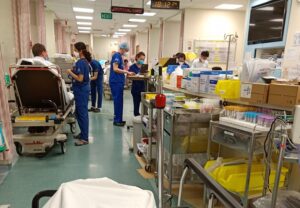
I was put on a stretcher, randomly parked at the busy corridor as A&E was full house. Another doctor took over my case, drew 4cc of blood from my right arm for full blood count. The whole evening, I was being pushed left and right to make way for other beds.
Duodenal ulcers
At 7pm, doctor diagnosed that I may have duodenal ulcers, this is usually caused by stress or Helicobacter pylori infection. He administered Esomeprazole diffused in saline drip to stop the bleeding and secretion of gastric juice. Throughout the whole night, I was being transferred from one observation ward to another observation ward.
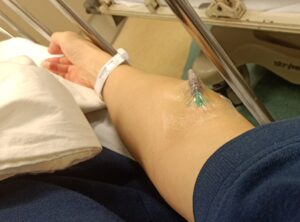
I wasn’t able to sleep well that night because I had not have any food or drink since 2pm, and nurses needed to measure BP and heart rate every now and then. Different doctors kept waking me up to check my condition and explain the treatment procedure. Medical social worker also did financial counselling. Some patients in agony kept pressing call bell for help, some coughing non-stop, and some snoring. All these had been going on and on the whole night…
Oesophago-Gastro-Duodenoscopy (OGD) procedure
Finally, I managed to sleep intermittently and get through the night. In the second day morning when everyone else was served breakfast, I didn’t get one as I was scheduled for an OGD procedure. At 11:50am, I was being sent to endoscopy ward and administered sedative. OGD procedure was done at 12:20pm and I was sent back to observation ward at 1:40pm to rest. From afternoon to night, I was hooked up with probes to monitor heart rate, back on KCl drip one bag after another. Nurses also drew blood every 8 hours to check my full blood count.
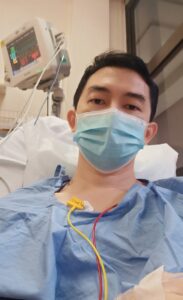
Prepare to discharge
On the third day, I was served a bowl of porridge and a hot beverage (finally!). Nurse continued IV infusion on Esomeprazole. Doctor informed that there were 2 ulcers in my duodenum and my condition was stabilised, I can be discharged!
Upon discharged, I was given a 10-day MC, I went on to pharmacy to collect my medicines and antibiotics, together with the scheduling of follow-up appointment.
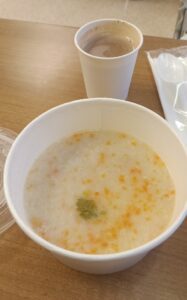
The After-effect
Resting at home after discharged was really not fun. First of all, because I had been lying motionless on stretcher with both arms on IV for 3 days, I developed backache. For the few nights at home, I couldn’t sleep comfortably on my own bed.
Secondly, the medicines prescribed (omeprazole, clarithromycin, and amoxicillin) are causing a strong bitter taste in my mouth, I couldn’t taste the foods as normal. I guess this is the main reason why many elderly and patients are complaining the hospital foods are tasteless.
Thirdly, because of the bitter taste in my saliva, I am getting poor quality sleep. I keep having bad dream and sometimes it is so disturbing that it wakes me up in the middle of the night. I end up feeling more lethargy in daytime.
Once bitten twice shy
Throughout this episode of A&E visit, I learned a few lessons:
- Know your symptoms, if there is any abnormality, seek medical assistance immediately. Sometimes, google can be your best resource.
- A&E is there to stabilise your condition, so that you can be discharged back to your normal life. Not so much on bring you good quality of life. Do not expect uninterrupted sleep, comfortable bed, and sumptuous meals.
- If you have insurance protection, admit to private hospital. At government hospital, be prepared to be examined by different junior doctors. Junior nurses will also take this opportunity to practise venipuncture skill even though you already have cannula inserted to your arm.
- There are consequences if you are stuck in A&E due to unavailability of hospital bed.
- You will not be able to claim insurance as insurance provider requires you to be warded. Staying in A&E is not being considered as ward.
- Being in A&E, means you will not be getting a shower, changing clothes (unless you have other procedure), brushing teeth, shaving, choosing meals from menu, etc.
